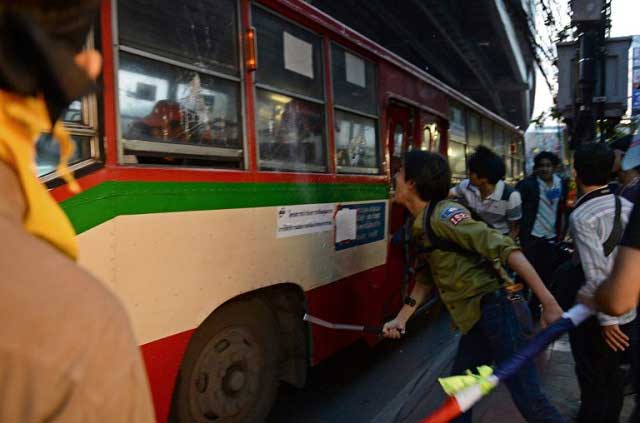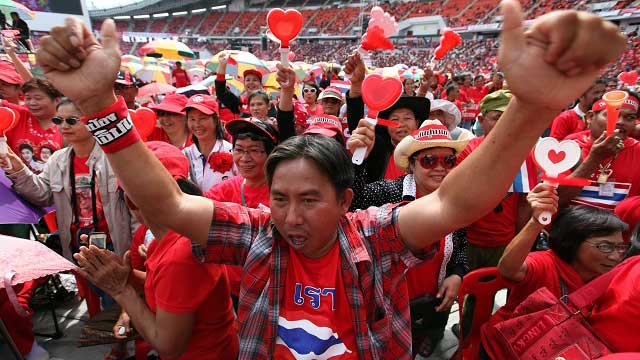SUMMARY
This is AI generated summarization, which may have errors. For context, always refer to the full article.

BANGKOK, Thailand (3rd UPDATE) – Mass opposition protests aimed at overthrowing Thailand’s embattled prime minister turned violent on Saturday, November 30, with one person shot dead and several wounded as the government called on the army to protect key state buildings.
The demonstrators, who want to replace Prime Minister Yingluck Shinawatra’s government with an unelected “people’s council,” have mounted the kingdom’s biggest street rallies since political violence in Bangkok 3 years ago left dozens dead in a military crackdown.
The protesters are united in their loathing for Yingluck’s brother Thaksin Shinawatra, a former telecoms tycoon turned premier whose overthrow by royalist generals in 2006 unleashed years of political turmoil and sometimes violent street protests.
As tensions soared in the capital, opposition demonstrators attacked a bus carrying “Red Shirt” government supporters heading to their own rally at a sports stadium in Bangkok, throwing stones and other objects, according to an AFP photographer at the scene.
Protesters also hurled bottles at police near the venue, where more than 70,000 Red Shirts were gathered.
Gunshots
Gunshots were later fired near the stadium, leaving one person dead and several wounded, according to police, although the circumstances of the attack were unclear.
“A 21-year-old man was shot dead by two bullets to his left side,” said Boonchuay Pochantong, an official at a nearby police station in the capital.
While the protesters’ numbers have fallen sharply since an estimated crowd of up to 180,000 people joined an opposition rally on November 24, they have increasingly sought out high profile targets in what experts believe could be an attempt to provoke a military coup.
Demonstrators used piles of sandbags Saturday to try to climb over barriers protecting Yingluck’s offices at the Government House, but were prevented by police from entering. Yingluck was not believed to be present at the time.
With the situation deteriorating, authorities announced more than 2,700 troops would be mobilized to reinforce security in Bangkok. Protesters have stormed a number of government buildings in the capital over the past week, meeting little or no resistance from police.
“We have information that there will be efforts to escalate violence in several areas,” said National Police spokesman Piya Utayo.
Protest leader Suthep Thaugsuban said demonstrators would try again on Sunday, December 1, to take control of Yingluck’s offices.
“Tomorrow our group will enter the area of Government House,” he said in a speech to supporters.
Organizers of the anti-government demo have urged people to turn out in strength this weekend in a final push before celebrations for revered King Bhumibol Adulyadej’s birthday on December 5, which is traditionally marked in an atmosphere of calm and respect.

PM calls for calm
Yingluck has insisted she will not use force to break up the rallies. (READ: Thai PM vows to meet protesters with pacifism)
“I want to ask protesters not to confront each other in a way that may lead to violence,” Yingluck told reporters at a briefing at police headquarters on Saturday.
Hundreds of opposition protesters also massed at two major state-owned telecoms firms, cutting the power supplies in a move that caused widespread disruption to Internet services in the country.
“My fight strategy is to march empty handed. I feel tomorrow we will win,” protester Sanit Ounjai, a 45-year-old rubber farmer from southern Thailand, told AFP.
Thaksin is adored by many of the country’s rural and urban working class but hated by many southerners, middle-class Thais and the Bangkok elite, who see him as corrupt and a threat to the monarchy.
He lives in self-imposed exile to avoid a jail term for a corruption conviction that he contends, is politically motivated, but is widely believed to be the real power behind the ruling party.
Pro-Thaksin parties have won every election for more than a decade but Yingluck has given no indication she is thinking of calling fresh polls as a way out of the crisis.
Yingluck on Saturday said security officials were “ready to defend” Government House, but added that they would do so with “leniency.”
Yingluck’s Puea Thai party came to power in the 2011 elections on a wave of Thaksin support, after a bloody 2010 military crackdown on Red Shirt protests under the previous government left some 90 people dead.
The protests began on October 30 in response to a ruling party amnesty plan that could have allowed Thaksin’s return. The protests have snowballed despite the Senate’s rejection of the bill. – Rappler.com
Add a comment
How does this make you feel?
There are no comments yet. Add your comment to start the conversation.